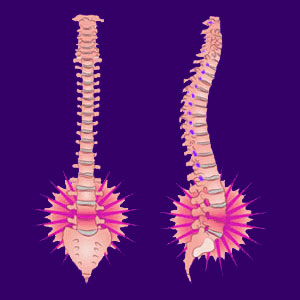
A herniated disc in the lower back can be a devastating diagnostic blow for any patient to receive. Disc herniations convey the specter of doom upon all who are diagnosed with them. Lower back pain conditions have long been the bane of the working person and especially those involved in manual labor and seated job roles. A lower back injury is perhaps the worst possible agony that a human can endure.
This article discusses my own experiences being diagnosed with 2 lower back herniations very young in an active life. I detail the reasons why my pain worsened after diagnosis and how I was never informed of the true asymptomatic nature of most disc pathologies by my doctors. Luckily, through diligent research efforts, I discovered the facts for myself and have dedicated myself to helping others to do the same. I can still feel the worst instances of acute pain etched deeply into my mind and heart to this very day, despite being completely cure of pain now thanks to my own proactive efforts.
Herniated Disc in the Lower Back Diagnosis
I clearly remember feeling faint when my doctor announced that I had 2 herniated discs in my lumbar spine during my early 20’s. I felt as if my life was over and my back would never be the same again.
I had already suffered from several years of episodic acute back pain since the age of 16, which had been blamed on degenerative disc disease, mild scoliosis and muscle imbalances.
My pain worsened terribly after the confirmation of my herniated discs. My doctor had ordered an MRI of the spine to locate what he thought might be a disc injury. Prior to the test, he had built up such anxiety in me by explaining all the potential horrors of a disc herniation. I had also been conditioned to fear herniations, since my mother had one which resulted in a horrible and unsuccessful surgery in her low back, as well. I was scared to death and my heart broke when my worst fears were discovered to be true: I had herniated discs; 2 of them.
Lumbar Herniated Disc Evolution
Once diagnosed, I intensified my treatment regimens to find some measure of relief from my steadily worsening pain. I tried therapy after therapy and treatment after treatment. I tried the medical approach, the alternative approach and a variety of complementary medical practices. Nothing worked.
Sure, I received some minor benefits from a few lower back pain treatments and was convinced that some were keeping my pain from taking over. In reality, I was simply paying all this out of pocket expense for nothing. I wasted literally tens of thousands of dollars on treatments to cure conditions which turned out to be completely innocent.
Maybe this is the reason why I am so fired up over the injustices of back pain. Do you think? Eventually my continuing treatment and research efforts brought me around to meet an interesting man who is world renowned for treating chronic pain: John E. Sarno, MD.
Dr. Sarno changed the course of my life, as well as its very purpose.
Herniated Disc in the Lower Back Realities
I learned from the very best doctors in the orthopedic, neurology and physical medicine fields, such as Dr. John Sarno, that disc herniations are almost never responsible for lasting pain. Sure any injury can hurt for a short time, but should heal in a matter of weeks; not 18 years. I continuously studied back pain as if my life depended on it. After all, it did.
Know thy enemy and thou shalt conquer.
I took this to heart and became a full time back pain scholar. I learned why my chronic lumbar back pain never improved. I finally had a logical answer which made perfect sense, but defied detection until I realized the truth about disc pathologies. I applied this knowledge to my own back pain condition and began to feel better. I actually cured myself of all of my pain.
The lessons I learned still serve me well, for I do not blame these 2 lumbar herniations for much of anything in terms of symptomatic activity. Let’s end this discussion with some basic facts to consider:
Most herniated discs in the lower back are caused through normal degenerative processes. They are not inherently symptomatic and in fact, only a small percentage of disc pathologies will demonstrate the characteristics which make them capable of causing any pain whatsoever.
Mild to moderate disc issues should actually be called nonissues, since that is what they are, almost without exception. Please consider researching these truths for yourself before wasting decades of your life seeking ineffectual treatment, like I did.
Back Pain > Herniated Discs > Herniated Disc in the Lower Back





